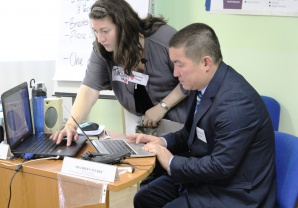
Maxwell Watson: People need to know that you do not have to die in pain
19/09/2013
Kazakhstan’s International Obligations to Freedom of Speech
29/01/2014This project was supported by the Emerging Powers Programme Fund of the British Embassy Astana and Soros Foundation-Kazakhstan under its Local Budget Initiative. Askar Kushkunbayev, coordinator of the Initiative interviewed Tanya Burdett – the trainer.
AK:How did the training idea emerge and which specific tools did you choose for training and why?
TB: The International Association for Public Participation (IAP2) and Soros Foundation Kazakhstan have been working together for a few years and exploring opportunities to increase capacity of public participation practitioners throughout Kazakhstan. This also involved members from Soros foundation-Kazakhstan attending IAP2 Training in London (UK) at the University of Westminster, delivered by Essential Planning Ltd. Through this, and with the assistance of the British Embassy, the training of 12 NGO leaders took place in September 2013. The British Embassy assistance through the Emerging Powers Programme Fund aims to provide Kazakhstani civil society groups with a greater understanding of how international systems and processes work, and from which they can leverage domestic demand for progressive Kazakhstani policies. We selected the IAP2 5-day Certificate Programme as a delivery vehicle for this capacity building as it focusses on three critical aspects of effective engagement – planning, communications and techniques.
AK: What specific public participation tools could be applied for Kazakhstan realities?
TB: All three modules of the IAP2 Certificate Programme can be applied to the Kazakhstan situation – Planning, Communication and Techniques. The key ingredient is that the core values attached to the public participation process be understood and adhered to. Once it is comprehended that it is the process that is important, and that the process is decision driven, all projects, irrespective of size, budget or nature will benefit from public participation input. CSOs will realise that decisions can reflect their needs; companies can see that projects will better anticipate and manage risks, and may become more efficient and effective in the long run with smoother design and approvals phases and ongoing community support through implementation; and governments can facilitate the democratic rights of its citizens through active engagement. Specific techniques for specific situations are detailed in IAP2 training, and the process is adaptable to projects from large to small, and from the developed and transitional world perspectives. Beyond specific tools, an understanding of the core values enables tailored techniques to be developed.
AK: Why public participation matters? Why engage public?
TB: Public participation encompasses most basic democratic principles to which many countries either commit or aspire. The UNDP consider transparency and public engagement (citizen involvement) in decision-making to be two of the pillars of good governance. A thorough grounding in the principles, values and procedures by these 12 participants, can help filter out to the larger community and aid in the attainment of these universal ideals. The involvement of stakeholders in the process of decision-making can also lead to better and more sustainable decisions for all those concerned – the communities impacted, civil society organisations, society in general, governmental entities and the corporate world.
AK: What opportunities do you see in Kazakhstan in terms of IAP2 presence in future?
TB: IAP2 is an international organization advancing the practice of public participation. It advocates on behalf of members and is building an international reputation for the public participation practice and profession. It supports international research and offers professional development training and services. A real and exciting opportunity exists for those who are interested, perhaps beginning with the group who undertook the recent Certificate Programme, to form their own IAP2 Affiliate for Kazakhstan. When starting out, Affiliates may receive advice and assistance from other Affiliates around the world. As a designated Country in Transition, Kazakhstan has made enormous strides in the last few decades in the spheres of democratic and economic development, but there is more to do. IAP2 in particular, and community engagement more generally, could definitely have a role to play in this. Many of the large-scale infrastructure developments currently underway or proposed could benefit from an active public participation element. This will lead to more sustainable decisions for corporate organisations and Kazakhstan society in general.

